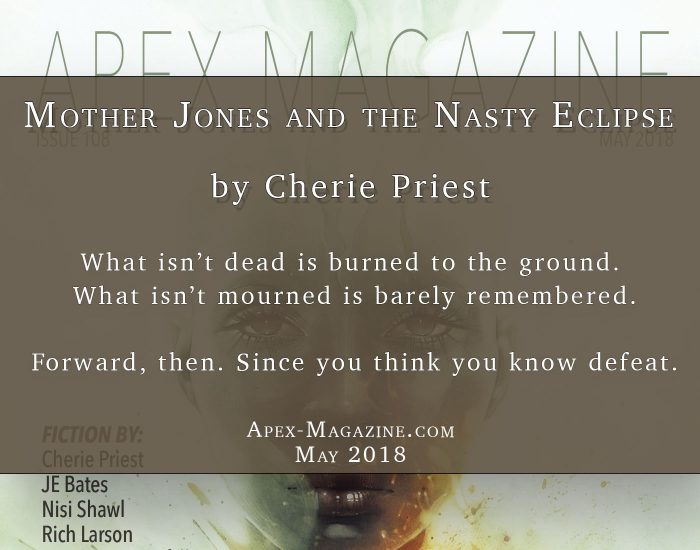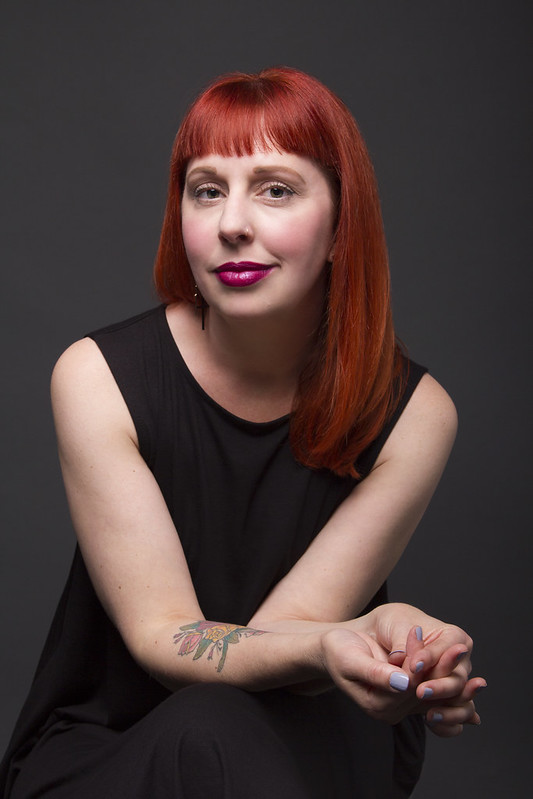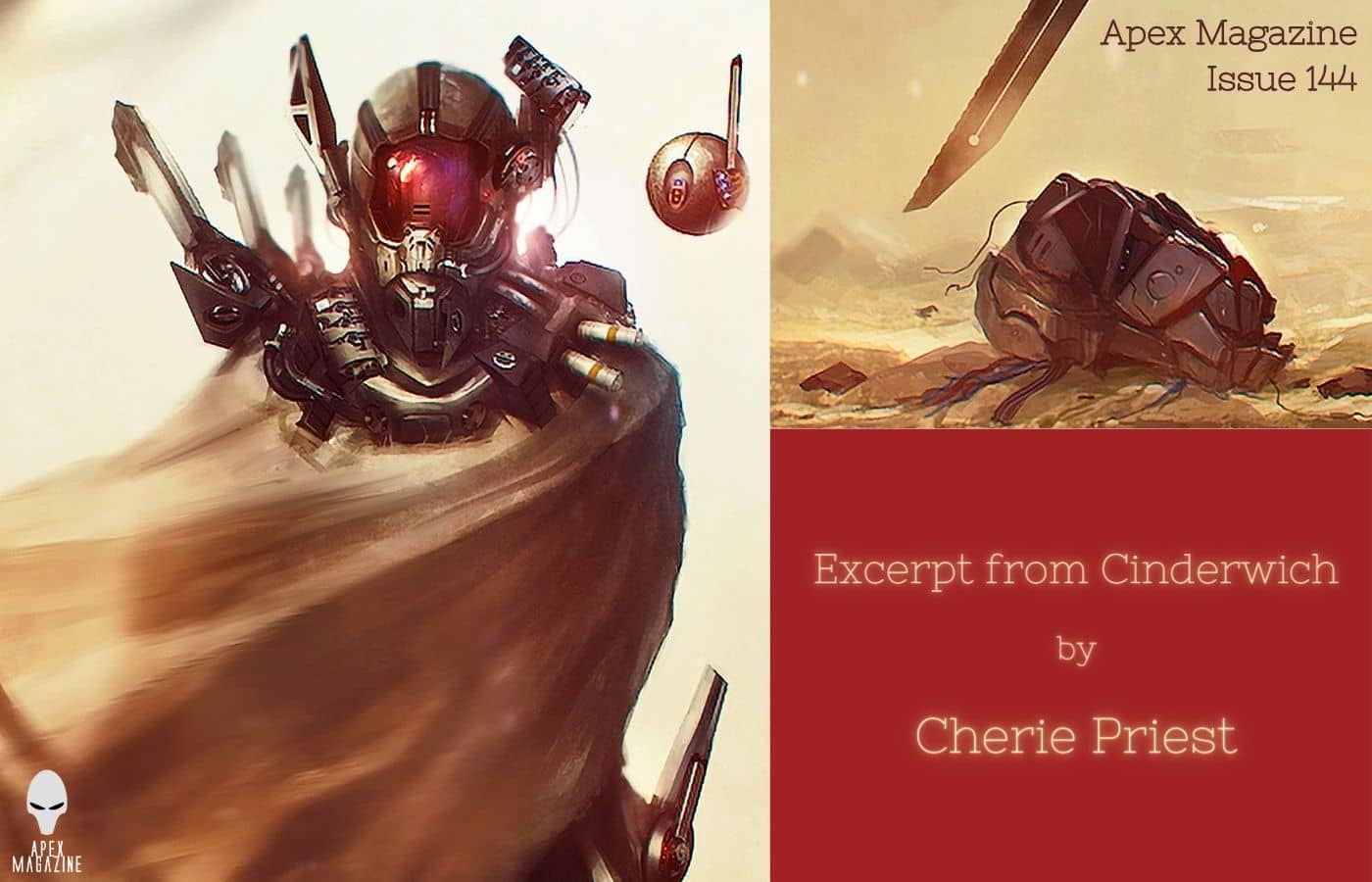
Not everything that’s missing was taken, but once it’s gone, it’s gone, ain’t it? There’s nothing to be done about it now. What isn’t dead is burned to the ground. What isn’t mourned is barely remembered.
Forward, then. Since you think you know defeat.
Nothing was easy for me, either, you know. In the beginning, I failed more often than I helped, and I was regularly wrong. I thought there were lines we’d all agreed not to cross. I thought there were rules, and maybe there were, but they only applied to us. You learned that one the hard way, didn’t you? Well.
Bless. Your. Heart.
I meant to ask you, before I lose the thread: Did you see the eclipse?
There’s always an eclipse.
There’s always a moment when it goes all dark and the wind twists coldly through the trees, and you think maybe the sun will never come back again—even though you damn well know better. Now, let me tell you: I’ve seen that eclipse and others, too. They’re all alike. Just two hours in the same day, with a shadow in the middle. That’s all.
You and I, we both know from shadows, don’t we? We’ve gone cold sitting inside them, and we’ve cast them as big as the moon. We have pulled the tides with our will, all while suffering the slings and arrows of outrageous fortune.
I’ll tell you what I know of outrageous fortune: He’s a son of a bitch.
§
I knew those sons of bitches might starve us, they might cheat us, they might maim us. All these things we expected in those early years. We were naïve, I suppose, for thinking they might not murder us outright. Why wouldn’t they? Who was there to stop them?
Tell me nothing of the hand that rocks the cradle and spare me your stories about a helpful village. Sing instead of the gnarled and brittle fingers of tight old men in loose skin, and clothes that cost more than my coffin. Remember how they put their repeating guns on train tracks and drove them back and forth, firing at the tents where women and children waited for men to come home from the strike line.
Remember. We bled for asking nicely.
Remember. They opened fire because we told them we were human.
§
Remember. Everything burns eventually.
A family. A home. A war. Chicago went up in flames, bright as a witch.
How many times can you lose everything and still come back? How do you keep moving, when nothing’s left except for what’s inside? I don’t have a real good answer, I’m afraid. All I can tell you is that I stood up again, no more finished than you ever have been. I shook the ashes out of my hair and I straightened my skirts.
They called me a foreigner. They told me to stay home and knit.
They said to close my mouth, but if I did? No one would speak for the girls with the ruined bones, the nubs of fingers, the broken feet. They told me to sit in silence while men were beaten to dust in the mines, while the fluttering bright canaries died likes flies, and the diggers’ lungs filled up with dust that turned to tar that turned to fistfuls of mud in their graves.
I stood loud against bastards and cowards because I liked to tell the truth, but a woman shouldn’t say such things. I shouted them from the highest peaks.
It’s funny, and maybe you know how it goes, but no one heard me until I came back to Earth. I came around the mountain, driving the greatest white horses you ever did see, that’s how they tell it. (And when they tell these stories about you, don’t you correct them. Not if they’re any good.) Let them write their songs. Let them sing stories of how I came down from on high.
They will say that I spoke with God.
§
Mostly, I spoke with men. I know you know how that feels, always the lone lady in a room of antsy fellows who halfway want your help, and halfway want your hand. Those halves of a man will duel until the end of time, I think, but that’s no reason to take it sitting down. It’s also no reason to leave them hanging. All God’s children got problems.
§
Often, I spoke with children. Sometimes, I spoke with women like you, or like the woman you would have been—an angry lady with an ostrich hat and a sign. I didn’t walk with women like that. Maybe I should have. Maybe I would have, if I’d seen you up on the stage—small and fierce, and harder than diamonds; swimming in balloons that dropped from the ceiling, tagging them with the joy of a kitten and blinking in the lights.
But you weren’t there, and you and I? We’re not the same.
I chose my own battles. Maybe I’d choose different ones now, on this side of the eclipse.
§
I never did stop fighting the fights I’d picked. Nobody ever let me.
I fought the world over and over, losing ground and gaining ground. Every time the news was sick to death of me, I came back anyways, and I pointed my finger at the widows and orphans, at the men without legs, the boys without eyes, the girls with nothing but scars.
I took my rage to the ink-slingers because, I swear to God, I thought if everybody knew, then someone somewhere would have to do something. But the goddamn editors told me no because the papers were owned by the local lords. Same as everything else.
I went to those lords and they shut their gates in my face. I went to the governors, to the senators, to the mayors and ministers. None of these fine, upstanding men were too inclined to hear me.
I went all the way to the president. He never replied. I wasn’t worth it to him. I didn’t have enough money, I guess.
I learned that money is heavy, and it don’t move easy. The owners of the mills drew lines, and they bought armies to push across their maps like toys. The coal barons rattled their sabers on the barricades they’d built to thwart the anarchists, the strikers, and little old ladies like me.
But I was not afraid. I was just pissed.
I stood at a podium and I raised my fist like a guillotine’s blade. I did not stay home and bake cookies. I went out and made war.
§
One time, a man named for a storm said I was the most dangerous woman in America. I bet he thought he’d cursed me. (He was just about that stupid.) He called me that, and he made me that. For here’s the secret, dear: a curse is every bit as good as a blessing. A curse can be claimed, and held, and shaped. It can be thrown like a bomb.
I saw what they did to you.
I saw them dismiss you, a naughty school child in a white pantsuit. I saw you come back again, swinging. You stood on the steps of Planned Parenthood and you talked like you had every right to, you nasty thing.
You were proud before the small girls in their sashes. You were strong alongside the mothers who’d lost their sons to the grinding mill of war. You were bookish, you were prepared, you were steadfast while the monsters crept behind you, casting creepy shadows and shitty spells. You were certain in the face of conspiracy and crimson caps.
You woman.
You wore it like a badge of honor.
§
You know what a badge is, don’t you? It’s a tiny shield. That’s why they’re shaped like that, and why they sit on a man’s chest, over his heart. You can shrink a symbol until it’s so small that it fits in a pocket, but it never loses its power.
That’s magic, right there. Same kind of magic as a curse.
We do have magic, dear. Some of it, they gave us by accident. Some of it, we made ourselves. You really took the wand and ran with it, didn’t you? You forged yourself, tempered yourself into something much harder than you should’ve had to be. You were already enough. You were more than enough—more ready than any human in history and that’s a fucking fact.
They’ll take the facts away from you, if you let them.
They’ll replace your facts with their own, if you don’t.
§
They flooded the whole world, just for you. Facts upon facts, invented from thin air, spun light as cotton candy at a county fair. Which weighs more, a ton of cotton or a ton of bricks? You already know the answer, and you know which is worse, too. To be smothered so slow, to feel the weight of lies and rumors and even some of the terrible, gritty truths on your chest and know how heavy history is. Any single thing you’ve ever done in your whole life, weighed without context against the possibility that you might be worthy of grace or power.
They forgave you nothing. They held up signs accusing you of having lived and never gave you credit for having learned.
The man who came before you, he knew all about that brand of baggage. I watched the two of you clash, neither one wrong and neither one exactly right, standing on top of a heap the whole world said was never yours to climb. There was no blueprint for what followed in his wake, though it shouldn’t have surprised anyone.
You followed in his wake, but you didn’t come alone.
You marched under his banner and all of his enemies joined all of your enemies. In his wake came ghosts. Ghosts wearing sheets, ghosts wearing nooses. At the gate, you met angry men with grasping hands, clasping claws. Tiki torches burning bright for the monsters and witches alike.
They called me a witch, too. A witch, a bitch, and worse than that—and I loved it. They called me a woman, and I called myself the mother of thousands. They called me old, and I told them I was more ancient and powerful than they even knew.
Too ancient to be found. Too powerful to hide. Too much a witch to lie down and die. For Christ’s sake, it’s only an eclipse.
§
The most dangerous witch in America: Now that’s a mantle worth carrying.
I hear that, when it was over, you took to the woods. How fitting that you went to the trees, walking old paths in sensible shoes, beside a man who did you harm and help in equal measure, I should think.
(I envied you, with the smiling old warlock at your side.)
But you went to the woods, and they chased you. The all-seeing cameras, the tragic columns, the bleeding hearts, the gropable tits, the spinning wheelchairs, and the baffled binders … they traded whispers, collected rumors like baseball cards. They combed the hills, seeking salvation, still believing in awful possibility of hope.
Hope is not a plan, or that’s how I heard it after the Storm.
Let’s say this instead: Hope is a storm. I like that better.
Hope is the opposite of a curse, in its way, both good and bad.
Its goals are goals of the heart, and the heart is never full. It’s the most human thing of all, this endless need, the bottomless hole that can never be filled and can only be negotiated with. All you can do is make your promises and do your level best to keep them when you can. Admit it when you can’t. Make new promises and make new plans. Revise the old ones and see if they’re enough to buy you time. Feed the heart, for it is always hungry.
But.
Hope is the most important thing, too. It is every brick in every wall, every bit of essential, structural garbage in every barricade, where every revolutionary eventually stands. Don’t let anyone tell you different. Not even me, and I halfway want to.
§
You must have seen the eclipse. You must have watched the sun go down in the middle of the day and creep back one white sliver at a time. You must have felt the hairs on your arm lift up like stars when the sky went purple, then black. You must have caught your breath in your throat when the stars came out, just for you. You must have let slip a tiny prayer in those precious seconds, when the moon crossed the sun and conquered it, and the whole country fell under its quiet spell. It must have felt familiar.
It might have felt too close. I’m sorry about that. That’s not your fault.
But women have looked to the moon since time began, and you’re no different. I’m no different, for all that I wanted to be.
Did you go into the woods to watch the sun defeated, even for those few moments? Did you look through smoked glass, and watch the light narrow through the branches overhead?
Or were there clouds? Were you thwarted even there?
If I’d known you were wandering the woods, walking brisk or slow with the warlock and counting birds or kicking leaves, I would’ve kept you company. If I’d known about the eclipse any sooner, I might’ve sought you out—but things are different here.
It’s just as well. I don’t think we would’ve been friends. Neither one of us has often been accused of being very nice. That ain’t fair, but so what? Nothing else is fair, and that’s not news to either one of us.
But you’ve still got time. You’ve got time, and all I’ve got is a myth.
No, that’s not true. I’ve got a legacy, and so do you. Give it time, and you’ll even get your myth.
Maybe this will make you feel better, and maybe it won’t, but I’m no good at comfort, so here you go: History forgets, and history remembers. It treats me kinder than my own days ever did, and it’ll be the same for you. You just watch.
I hope you live to see it. I hope you come back to look.
I lived for so long, we all forgot how old I really was.
I threw myself a birthday party and called myself a hundred, and nobody stopped me. Who wants to argue with a witch so old, when she’s lived so long and collected so much magic? I’d do worse than turn them into frogs, and they know it. I’d turn them into men who would suffer the results of their own cruelty and selfishness.
There are people in this world who understand nothing unless it touches them, do you understand what I mean? If it doesn’t happen to them, it’s just not real. Unto them, you have to wish hardship. You have to wish pain, sickness, and loss. If you don’t, they get mean and greedy. They need to be held in check, and I did what I could to lay you some foundations.
Now it’s your turn, and I give you my blessing.
May you live so long, you forget your birthday and no one dares to argue when you call yourself a crone. May you watch your daughter raise her children and hear her teach them of what you did, and what you won, and what was stolen from you. May you rise. May you be the mother of multitudes, as I was; may you follow in my wake. May you find that history is sometimes swift, and that it honors you. May your enemies wither in their sorrow until they become everything they fear, and lose everything they’ve ever taken by trick or force.
To hell with ’em.
Let ’em think we’re immortal, and when we finally do die, we’ll prove them all right.












